
CHANGE YOUR LIFE. CHANGE YOUR WORLD. Vol 23 • Issue 12 THE BIRTH OF JESUS God’s Son comes to earth Lonely at Christmas? 5 tips to beat the blues Meeting Jesus A love story
EDITOR’S INTRODUCTION
jesus and the cobbler
One of my favorite Christmas stories is about an elderly cobbler who dreamed one Christmas Eve that Jesus would visit him the next day.1 The dream was so real that he was convinced it would come true.

So the next morning he got up and decorated his shop and sat down to wait for Him.
The hours passed and Jesus didn’t come. But an old man stepped inside to get out of the winter cold. As they talked, the cobbler couldn’t help noticing the holes in the old man’s shoes, so before he left, he reached up on the shelf and gave him a new pair.
Still, Jesus didn’t come. But a woman knocked at the door and told him she hadn’t eaten that day, and could he spare anything for her family. The cobbler gave her the lunch he’d prepared for himself. Then he sat down again to wait for Jesus.
Instead, he heard a child crying in front of his shop. It was a boy who had been separated from his parents and was lost. This was in the days before telephones, so he put on his coat, locked his shop, and led the boy to his address a few blocks away.
That evening, the cobbler reflected on his day with a twinge of sadness that his dream hadn’t come true. Oh Jesus, why didn’t You come?
And then he seemed to hear a voice saying, I came three times today. I was the man with the cold feet. I was the woman you gave food to eat. I was the boy on the street.

Jesus had come. And the cobbler had cared for Him without knowing it.2 ***
One of the paradoxes of the modern world is that the majority of people who celebrate Christmas in one way or another have never really heard the real Christmas story. Even many of those who’ve seen Nativity displays, adverts, or Christmas movie clips and can identify the characters—Mary, Joseph, Baby Jesus, some shepherds, some wise men, some angels—don’t actually know what happened to them or why it matters.
That’s hardly their fault. The Christmas ecosystem has become cluttered with commercial interests that detract from its message. To be honest, most of us could use a refresher. That’s why this issue of Activated includes a special four-page feature (pp 4–7) to retell that story in detail.
May you and yours have a wonderful and happy Christmas!
1. This version was adapted and shortened from Leo Tolstoy’s short story “Where Love Is, God Is.”
2. See Matthew 25:37–40.
For more information on Activated , visit our website or write to us.
Website: activated.org
Email: activated@activated.org
Local contacts: South Africa: Tel: (082) 491 2583 Email: sales@bigthought.co.za India: Email: activatedindia@activated.org Nigeria: Cell: +234 (0) 7036963333 Email: activatednigeria@activated.org Philippines: Cell: (0922) 8125326
Email: activatedph@gmail.com
Editor Ronan Keane Design Gentian Suçi
© 2022 Activated. All Rights Reserved.
All scripture quotations, unless otherwise indicated, are taken from the New King James Version®. Copyright © 1982 by Thomas Nelson. Used by permission. Other Bible quotations are from the following sources: New Living Translation (NLT). Copyright © 1978, 1996 by Tyndale House Publishers. Used by permission. English Standard Version (ESV). Copyright © 2001 by Good News Publishers. Used by permission. Contemporary English Version (CEV). Copyright © 1995 by American Bible Society. Used by permission. New International Version (NIV). Copyright © 1978, 1984, 2011 by International Bible Society. Used by permission.
Vol 23, Issue 12
2
THE LAST STOCKING
By G.L. Ellens
Every year at Christmas, my friend Ira and I get together to assemble Christmas stockings for the orphans at two nearby orphanages. It gives us a lot of happiness to do this, as both of us are far from our families at Christmas.

We had set up a little assembly line in my living room and just finished putting various toiletry items, a hand towel, Christmas candies, etc., in the last of the stock ings—one for each orphan.
Looking around, we noticed there was exactly one of each item left.
“You can take them,” Ira said.
“Not me!” I laughed. “I don’t need any of it.”
So the extra materials were left in a little pile on the coffee table.
We finished bundling the stockings into boxes and loaded them into Ira’s car so she could deliver them to the orphanages.
“There’ll be a lot of happy children there, for sure,” I smiled as I waved goodbye.

That evening, after all the stockings had been deliv ered, a staff member at one of the orphanages messaged me: “Just letting you know that we’ve received a new boy since you were here last.”
Oh, no! I thought. They’ll be one stocking short! Poor kid!
I turned and saw the leftover items on the table.
Sure enough, there was exactly one of each left! I quickly assembled one more stocking and sent it off to the orphanage.
That’s amazing! I thought. Jesus knew all along about the new orphan boy. He was just waiting for us to find out!
God was so concerned about that one newly orphaned boy that He made sure he wasn’t forgotten at Christmas.—And He loves each one of us so much that He sent His only Son to save us.
That’s what Christmas is all about!—Not the gifts or the festivities, or even what we can do for others. Christmas is all about God’s love, a love that is so personal that not one person is forgotten, not even an orphan.
G.L. Ellens was a missionary and school teacher in Southeast Asia for over 25 years. Although retired, she remains active in volunteer work, as well as pursuing her interest in writing. ■
3
THE BI RTH
OF JESUS
By Peter Amsterdam
The story of Jesus’ life begins with the story of His birth, as told in the Gospels of Matthew and Luke. The Old Testament foretold His coming, revealing specific information about the promised Savior, and in the Gospels we find the fulfillment of the predictions regarding Jesus’ life, death, and resurrection, which brought salvation to the world.
When writing their accounts of Jesus’ birth, Matthew and Luke present different aspects and include different events, while at the same time covering much of the same ground and making the same significant points. Matthew’s account focuses on Joseph and his role, while Luke tells the story from Mary’s perspective.
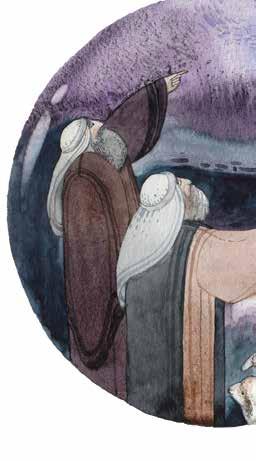
Matthew describes Joseph as a “righteous” man, meaning that he was an observant Jew who kept the laws of God. He was betrothed to a young woman named Mary who “before the marriage took place … became pregnant through the power of the Holy Spirit.”1 In first-century Palestine, betrothal was a period of engagement dur ing which Mary was already considered Joseph’s wife, although they hadn’t yet started living together. It’s during this period that Mary became pregnant.
Luke’s gospel tells us that the angel Gabriel was sent to tell Mary that she had found favor with God:
He came to her and said, “Greetings, O favored one, the Lord is with you! ... For you have found favor with
1. Matthew 1:18 NLT
2. Luke 1:28, 30–35 ESV
3. Luke 1:38 CEV
4. Fulton J. Sheen, Life of Christ (New York: Doubleday, 1958), 9–10
God. Behold, you will conceive in your womb and bear a son, and you shall call his name Jesus. He will be great and will be called the Son of the Most High … and of his kingdom there will be no end.” Mary said to the angel, “How will this be, since I am a virgin?” And the angel answered her, “The Holy Spirit will come upon you, and the power of the Most High will overshadow you; therefore the child to be born will be called holy—the Son of God.”2
This conception is like no other throughout history. Mary becomes pregnant through a creative act of God. We’re not told exactly how this creative act occurred any more than we’re told the details of how God created the world, other than that He spoke it and made it so.
Mary gives her consent when she says, “I am the Lord’s servant! Let it happen as you have said.”3 Fulton Sheen beautifully describes the situation like this:
What is called the Annunciation was actually God asking the free consent of a creature to help Him to be incorporated into humanity. … What He did, therefore, was to ask a woman, representing humanity, freely to give Him a human nature.4
The angel gives Mary a sign that these things will happen: he tells her that her elderly relative, Elizabeth,
4
has also conceived a son. “Mary arose and went with haste into the hill country, to a town in Judah” to visit Elizabeth who, just as Gabriel said, had also miraculously conceived a son, though she was past childbearing age.5 After staying with Elizabeth for approximately three months, Mary returns home to Nazareth.
Upon her return, she is faced with the obvious problem that she is three months pregnant, and Joseph knows that he isn’t the father. We can only imagine the hurt, pain, sadness, betrayal, and anger that Joseph must have felt as he “thought about these things.”6
If Joseph accused Mary of having committed adultery, the Mosaic law stated that she could be stoned to death.7 But Joseph, “unwilling to put her to shame, resolved to divorce her quietly.”8
It wasn’t possible to have a totally secret divorce, as the writ or certificate of divorce had to be delivered in the presence of two witnesses, and no matter what reason
5. See Luke 1:39 ESV.
6. Matthew 1:20
7. See Deuteronomy 22:20–21.
8. Matthew 1:19 ESV
9. Matthew 1:20–21, 24–25 NIV
Joseph would have given, everyone would have concluded that adultery was the real reason. By saying Joseph resolved to divorce her quietly, Matthew meant that Joseph wasn’t going to publicly accuse Mary of adultery. For Joseph, a righteous man who kept the laws of God, divorcing Mary is the right thing to do, but he’s going to be merciful in how he goes about it by not giving adultery as the reason.
But after he had considered this, an angel of the Lord appeared to him in a dream and said, “Joseph son of David, do not be afraid to take Mary home as your wife, because what is conceived in her is from the Holy Spirit. She will give birth to a son, and you are to give him the name Jesus, because he will save his people from their sins.” When Joseph woke up, he did what the angel of the Lord had commanded him and took Mary home as his wife. But he did not consummate their marriage until she gave birth to a son. And he gave him the name Jesus.9
The message given to him in the dream put an end to thoughts of divorce. The angel tells him that the child is from the Holy Spirit, and therefore he doesn’t need to fear that he will be breaking God’s law by marrying her, as no adultery was committed. Joseph then fulfills the second
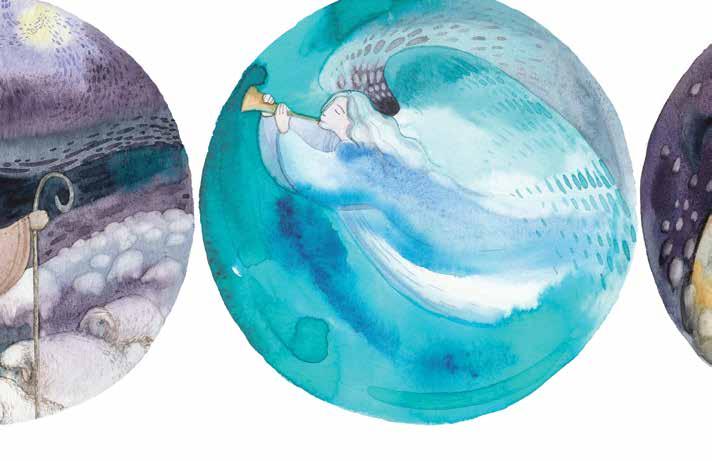
5
step of marriage by taking Mary into his home as his wife, thus assuming responsibility for Mary and becoming the legal father of the child who is to be born.
Some months after Mary returned from her visit with Elizabeth, Mary and Joseph embarked on a trip to Bethlehem. We’re told that the reason for this trip was that Caesar Augustus had ordered a census, and Jewish custom required Joseph to travel to Bethlehem, his ancestral home, as he was of the house and lineage of King David.
Luke describes how Joseph went from Nazareth, in the province of Galilee, to Bethlehem, a village in Judea six miles from Jerusalem, to be registered, and Mary accompanied him. While they were in Bethlehem, the time came for her to give birth. “And she brought forth her firstborn Son, and wrapped Him in swaddling cloths, and laid Him in a manger, because there was no room for them in the inn.”10
In the fields around Bethlehem, there were shepherds watching their sheep.
10. Luke 2:6–7
11. Luke 2:9–12 NLT 12. Luke 2:13–14
Suddenly, an angel of the Lord appeared among them, and the radiance of the Lord’s glory surrounded them. They were terrified, but the angel reassured them. “Don’t be afraid!” he said. “I bring you good news that will bring great joy to all people. The Savior—yes, the Messiah, the Lord—has been born today in Bethlehem, the city of David! And you will recognize him by this sign: You will find a baby wrapped snugly in strips of cloth, lying in a manger.”11
This was the third time an angel appeared to announce what God was doing in bringing Jesus into the world. The first was to Mary, the next one to Joseph, and now to the shepherds. In this case, the glory of the Lord—God’s radiance in the form of a brilliant light—shone around the shepherds.
We are then told that “suddenly there was with the angel a multitude of the heavenly host praising God and saying, ‘Glory to God in the highest, and on earth peace, goodwill toward men!’”12
While making an offering in the temple when Jesus was about one month old, Joseph and Mary met Simeon, a righteous and devout man who was “eagerly waiting for the Messiah to come and rescue Israel. When Mary and Joseph came to present the baby Jesus to the Lord as the
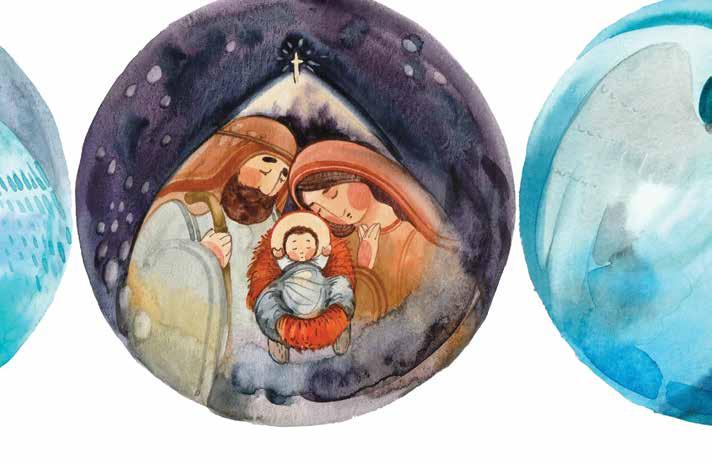
6
law required, Simeon … took the child in his arms and praised God, saying … ‘I have seen your salvation, which you have prepared for all people. He is a light to reveal God to the nations, and he is the glory of your people Israel!’”13 Joseph and Mary marveled, or were astonished, at the words Simeon spoke about their Son.14
Matthew describes other aspects of Jesus’ birth, including the visit of the Magi: “Wise men from the East came to Jerusalem, saying, ‘Where is He who has been born King of the Jews? For we have seen His star in the East and have come to worship Him. ’”15
It’s not specifically known where the wise men were from, but the most important fact is that they came from outside of Israel. Matthew illustrates how God is doing a new thing by highlighting the fact that, at Jesus’ birth, Gentiles are attracted by the light of God’s Son.
When the wise men came to Bethlehem, “they entered the house and saw the child with his mother, Mary, and they bowed down and worshiped him. Then they opened
13. Luke 2:25, 27–28, 30–32 NLT
14. See Luke 2:33.
15. Matthew 2:1–2
16. Matthew 2:11 NLT
their treasure chests and gave him gifts of gold, frankincense, and myrrh.”16 We’re never told how many Magi there were, though tradition holds that there were three, based on the three gifts listed.
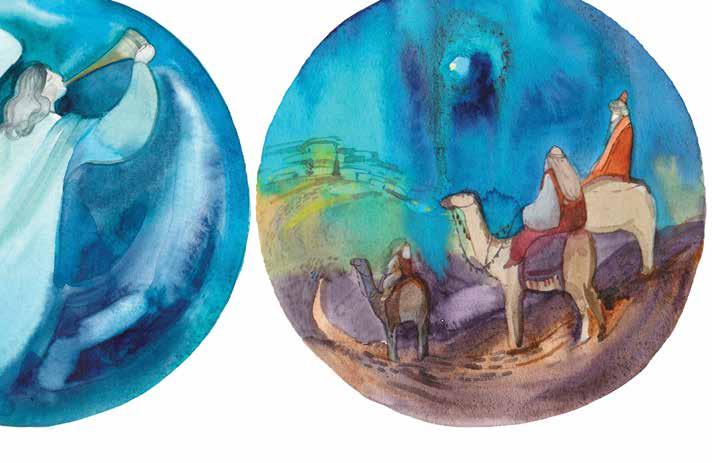
As we come to the end of the story of Jesus’ birth, we can see the fulfillment of God’s promise to send a Messiah to redeem humanity beginning to unfold. Since His promise was to be fulfilled within the world, God chose to enter the time and physicality of the world. God sent His Son into the care of two faithful believers, fulfilled the Old Testament prophecies about the coming Savior, and set the stage for His promised salvation.
God entering the world and living among His creation for the purpose of reconciling humanity to Himself through His Son’s death and resurrection is the most significant event in human history. The Gospels tell us how Jesus’ life, from birth to death and beyond, fulfills God’s promises and shows His great love for humanity by making it possible for us to become His children.
Peter Amsterdam and his wife, Maria Fontaine, are directors of the Family International, a Christian community of faith. Adapted from the original article. ■
7
Amazed, Treasured, and Pondered
By Sally García
[After hearing the angel announce the birth of Christ, the shepherds] hurried off and found Mary and Joseph, and the baby, who was lying in the manger. When they had seen him, they spread the word concerning what had been told them about this child, and all who heard it were amazed at what the shepherds said to them. But Mary treasured up all these things and pondered them in her heart.1
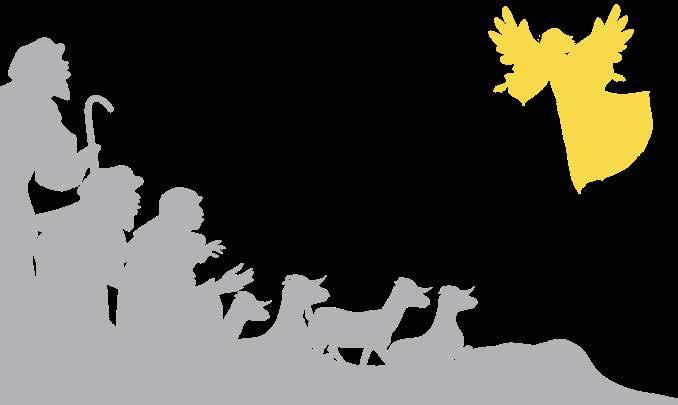
Everyone who heard the shepherds’ account was amazed—the tale of angels on a hillside, singing and directing them to the newborn baby of a visiting couple from Nazareth. “You’ll find them lodging in a stable.”
Meanwhile, Mary was quietly resting, contemplating the peaceful face of baby Jesus. She was thinking back over all the events of the last nine months. She treasured each recollection and pondered them in her heart. The beautiful synchronization, the details—so many scenes converging to the climax, the singular event—the arrival of the Messiah, the Savior—now lying in a manger. She remembered the angelic visit, Joseph’s dream, her cousin Elizabeth’s reaction, the hard trip to Bethlehem in her last moments of pregnancy.
1. Luke 2:16–19 NIV, emphasis added
Hadn’t it seemed like things were going awry when they couldn’t find a place to stay and she was, oh, so tired? In the most unusual of circumstances, the infant was born. Perhaps she wondered if God remembered His promises concerning this baby.
But when the shepherds brought their tale of a heav enly choir and divine instructions, she knew that God did remember and that heaven was rejoicing! Once again, Mary treasures the event and ponders it over and over.
What amazes me about the beautiful story of the First Christmas? What do I treasure when I ponder over this timeless account of the birth of my Savior? Like Mary, I think of how God’s Spirit was working out every detail, from the transcendent to the most insignificant—people, places, timings. This is God’s delight; He loves to work on these multiple levels.
I see how my life has intertwined with so many pre cious people, and how events in our separate existences unfolded to meet in grand moments of connection. I am amazed when I see the threads woven into the tapestry of my history, and I treasure each remembrance and often ponder them in my heart.
8
Sally García is an educator, missionary, and member of the Family International in Chile. ■
FINDING THE PURPOSE OF CHRISTMAS


After a couple of low-key Christmases in a row, due to health restrictions prompted by the pandemic, many of us have shifted to simpler, more intimate celebrations. Doing so has brought us back to the true message of Christmas: showing thankfulness and appreciation for God’s gift of His Son that night. And expressing that appreciation in acts of love to our fellow men and women.
Christmas is ultimately a celebration of God’s love for each of us. The best way we can celebrate Christmas is by giving Jesus our love and gratitude. It is also a time when we can stop and remember those who are often forgotten and reach out to help those in need.

These are the things that not only make God happy, but also help us find deep satisfaction. Christmas is not made special by presents, decorations, and parties, but by what we give to Jesus and to others. Giving from our hearts demonstrates true appreciation for all God has given us. ■
A PRAYER FOR CHRISTMAS
Jesus, You are God and man, King and servant of all. You left Your eternal throne in heaven and took on mortality. You became one of us, so that You could save us. I am overwhelmed with emotion when I think of how You humbly came into our world and changed it forever.
When You were born among us, You brought us the greatest gifts imaginable—salva tion, eternal life, peace, hope, love. Who would ever have thought such things would come in the form of a tiny baby, born to commoners, wrapped in rags, and laid to sleep in a feeding trough?
Thank You that because of Christmas, I’m never alone. Whether or not I am blessed with family and friends, whether I face good times or hard times, I always have You and Your love, because I have You in my heart. Thank You for choosing to experience both the joys and sorrows of Earth. Thank You for enduring the tears, pain, frustration, loneli ness, exhaustion, and death so that You could truly understand us. Never has there been a more perfect love than Yours!
9
LONELY
By Curtis Peter van Gorder
AT CHRISTMAS?
If you’re feeling lonely this Christmas, you’re not alone. Sad Christmas songs are popular because they strike a responsive chord in many.

For a number of people, Christmas this year will be tinged with the loss of a loved one or companion. Decorating the tree and all of the holiday traditions just aren’t the same when you’re by yourself and everyone else is enjoying their family and friends. As the classic song “Blue Christmas” goes: “It won’t be the same, dear, if you’re not here with me.”
But how widespread is loneliness at this festive time of year? Age UK estimates that 450,000 older people will be alone this Christmas. And the Campaign to End Loneliness says 800,000 older people in England are “chronically lonely,” almost three million are lonely, and five million regard television as their main form of company.
Chronic loneliness is more than just being on your own. It means that you feel isolated, without support from others over a long period of time. We can be sur rounded by people and yet still be lonely. This isolation can be self-imposed due to inhibitions, or it can be the result of a lack of communication skills, or physical challenges. In any case, this seclusion can cause feelings of stress, low self-worth, or depression.
Paul McCartney 2018 interview with GQ
Paul McCartney recounts that his song “Eleanor Rigby” (“All the lonely people, where do they all come from?”) was inspired by his experiences as a young boy. “When I was really little, I lived in a housing estate where a lot of old ladies lived. I enjoyed sitting around with them because they had these great stories about World War II. I used to visit one lady in particular and go shop ping for her—you know, she couldn’t get out. So I had that figure in my mind of a sort of lonely old lady. Over the years, I’ve met a couple of others, and maybe their loneliness made me empathize with them. So I started this song about the lonely old lady who picks up the rice in the church, who never really gets the dreams in her life.”1
Something we might draw from McCartney’s experi ences is how older people enjoy being around young people and sharing their stories. The older generation has so much they can pass on to the next generation, and the younger ones can benefit so much from those who have already walked further down life’s long highway.
When our family lived in Japan, we formed a singing group of our children and their friends to visit homes for
1.
10
CHRISTMAS?
the elderly during the Christmas season. The highlight of the program was after the performance, when the children would mingle with the elderly folks and talk with them. Some of the seniors remarked that, since we came regularly every December, they eagerly looked forward to our visit throughout the year. It seemed we were amongst the few visitors some of them had.
What can we do to alleviate others’ loneliness or even our own this Christmas? Here are some tips you might find helpful:

1. Reach out to those around you. Maybe you have a neighbor who has no family nearby, or you know of a friend who would love to invite you over if they knew you were feeling so alone. Take the first step to be with others by reaching out to them. Give yourself an opportunity to be with people and be a gift to others this season.


2. Help those in need. There are lots of ways to help those in your community at this time of year.
2. This list was adapted from the Billy Graham Evangelistic Association: https://billygraham.org/story /are-you-lonely-this-christmas
Whether volunteering at a local food pantry or sending Christmas cards, find an activity that you’re passionate about and show up.

3. Let Jesus’ presence fill your heart. Take this time of fewer distractions from social activities to get to know your Savior even more. Read His Word in the Bible and be open to seeing what He wants to teach you during this time.

4. Pray for others. If you hear of someone going through a rough time, stop and pray for that person. And don’t be afraid to ask for prayer for yourself if you need it.
5. Get out of the house when possible. There are different Christmas activities to enjoy this time of year—caroling and concerts, candlelight services, and Christmas light shows. Join in on the festivities and celebrating the birth of our Savior.2
Curtis Peter van Gorder is a scriptwriter and mime artist who spent 47 years doing missionary activities in 10 different countries. He and his wife Pauline currently live in Germany. ■
11
OCCASION TO L VE
 By Maria Fontaine
By Maria Fontaine
For many of us, since we were young children, Christmas has been a special time of celebrating Jesus’ birth, giving and receiving gifts, and spending time with family and friends. But Christmas is not only a time to enjoy these blessings ourselves; it is also the greatest opportunity of the year to tell the world about our precious Savior. Perhaps more than any other day of the year, it’s a time when people think about the miracle that is at the heart of Christmas—God sending His own dear Son into our world to lead us back to Him. Even in non-Christian cultures, people are interested in learning the true meaning of Christmas.
We who have experienced God’s love in Jesus have a chance to give the very best gift this Christmas, not only to those we know well and hold dear, but also to neighbors and strangers who share our world. There are those around us whose hearts are sad and weary, who cry out for a comforter, who yearn for a Savior. Some are over whelmed by fear and uncertainty. Others are filled with despair and hopelessness. Others are laden with burdens of bitterness and guilt, or are imprisoned in emptiness, or are plagued by pain, or are otherwise beset by problems too big for them to solve on their own.
1. See Matthew 5:14–16.
2. See John 20:21.
Jesus loves them and wants to take them in His arms. But He who is all-powerful, all-knowing, and all-loving must have our help! We are His eyes that can search them out, His ears that can hear their cry, His voice that can respond and comfort them, His arms that can embrace them.

You can make a difference this Christmas. Even the humblest attempt to share the little you may have can shine as a very bright light in others’ lives, a ray of hope to penetrate the darkness that shrouds them.1
Reach out to others. Tell them how Jesus came to earth to love them, how He died to save them, and how He rose again to deliver them into a wonderful new world that they can experience right now on earth and also
12
enjoy forever in heaven. Proclaim that we celebrate the birthday of a living Savior who alone is the answer to their deepest needs.
As His Father sent Him, so He sends us.2 Be Jesus’ hands. Be His feet. Be His eyes. Be His lips. Heal the brokenhearted; free the captives; raise those who are dead in trespasses and sins; welcome the rejected, the alienated, the ostracized.3 Preach the gospel to the poor; loose the bands of wickedness, undo the heavy burdens, let the oppressed go free.4 “Give them flowers in place of their sorrow, olive oil in place of tears, and joyous praise in place of broken hearts. Freely you have received, freely give.”5
And let’s not stop with Christmas! Let’s keep sharing and giving and loving others just as much throughout the year to come. Let’s make each day a celebration of Jesus’ birth, which brought the promise of new life for all.
Maria Fontaine and her husband, Peter Amsterdam, are directors of the Family International, a Christian community of faith. Adapted from the original article. ■
3. See Isaiah 61:1,3.
4. See Matthew 11:5; Isaiah 58:6.
5. Isaiah 61:3 CEV; Matthew 10:8
Thoughts to Ponder THE REASON FOR THE SEASON
What is Christmas? It is tenderness for the past, courage for the present, hope for the future. It is a fervent wish that every cup may overflow with blessings rich and eternal, and that every path may lead to peace.
Agnes M. Pahro
It is Christmas in the heart that puts Christmas in the air. W. T. Ellis (1845–1925)
As you enjoy all the blessings of life this Christmas, stop and think about what meager circumstances Jesus was born into. He had so much, yet became so little. All that we have, we owe to Him.
Maria Fontaine
It is Christmas every time you let God love others through you. Yes, it is Christmas every time you smile at your brother and offer him your hand.
Mother Teresa (1910–1997)

THE RISE OF THE UNCONQUERED SUN
There is no evidence of any kind regarding the date of Jesus’ birth. His nativity began to be celebrated on December 25 in Rome during the early part of the fourth century (AD 336) as a Christian counterpart to a pagan festival, popular among the worshipers of Mithras, called Sol Invictus, the Unconquered Sun. At the very moment when the days are the shortest and darkness seems to have conquered light, the sun passes its nadir. Days grow longer, and although the cold will only increase for quite a long time, the ultimate conquest of winter is sure. This astronomical process is a parable of the career of the Incarnate One. At the moment when history is blackest, and in the least expected and obvious place, the Son of God is born.
—Joe Pennel Jr.
13
MEETING JESUS
What about when Christmas comes along and you’re sad, grieving, or alone—or when, instead of anticipation and excitement, you feel dread and loss? You know this is supposed to be the happiest time of year, but you’re just not feeling it. That’s okay. You don’t have to fix your pain or grief or loss. We can’t anyways.
I don’t think that the shepherds watching the sheep on that first Christmas thought it was any kind of special night. It was just another cold Bethlehem night. Their town was overrun with visitors there for the census, a reminder of Roman oppression. Nothing looked espe cially hopeful.
But the angels filled the sky with the message that they didn’t need to be afraid; their Savior had been born that night in their town. Everything about that ordinary night changed, and suddenly there was hope. The Redeemer had come!
If you aren’t feeling up to all the festivities of the sea son, try focusing on the Hope of the season. Jesus came, and through Him, redemption for our sins, brokenness,
If you haven’t yet met Jesus and received Him as your Savior, you can ask Him to come into your heart with His love, life, liberty, truth, peace, plenty, and happiness here, now, and forever. Simply pray:
Dear Jesus, thank You for giving Your life for me. Please forgive me for my sins, come into my heart, grant me Your free gift of eternal life, and fill me with Your Holy Spirit. Amen.
By Marie Alvero
and separation from God. This reflection needs no tree and trimmings, no gifts and decorations. You alone, saved by Jesus, makes a party.
Here are some things you can do if this isn’t your most festive Christmas:

Read the Gospel of Luke, chapters 1 and 2, and let the hope of Jesus’ birth fill your heart.
Be part of something meaningful—a choir, a charity, a book club, a project, anything that interests you and helps connect you to others.
Get a change of scenery. This isn’t always possible, but sometimes, going somewhere new or doing a different activity will help to change your perspective.
Let Christmas pass simply. If you aren’t up for a big event, there will be other times for celebration.
Jesus will meet you where you are at, on Christmas and every other day of the year.
Marie Alvero is a former missionary to Africa and Mexico. She currently lives a happy, busy life with her husband and children in Central Texas, USA. ■
14
BETWEEN THE HOLIDAYS
By Joyce Suttin
When I was a child, I hated the days after Christmas. I’d gotten all my gifts and had nothing to look forward to. Likely, it was a problem with ingratitude. I often thought I should have gotten something better or had missed out on something.



As an adult, I’ve had the same feelings of unfulfillment after Christmas and have learned to keep busy to fight feelings of depression. The buildup to Christmas is such a busy time with shopping for gifts, planning menus, cleaning house, and preparing for the big day that I can barely think about myself. People are counting on me, and I need to be strong. I need to be organized. I need to make everyone else comfortable.
But those first quiet days after Christmas, I find it hard to keep up all that positivity. I think I’ve grown out of the child’s ingratitude with my Christmas gifts, and it’s more about not taking time to listen to my own heart and give myself some attention. It’s exhaustion catching up to me, after all that energy poured into others.
Christmas reminds me of my youth, of people I’ve loved, of sweet memories and also some bittersweet ones, as I think about losses. So many Christmases have come and gone, as time has flown into the present day. So many Christmases filled with giving and receiving, family and loved ones, and remembering those present and those past.
But then, as I lovingly pack away my Christmas ornaments until next year and begin looking forward to the New Year, I get excited. I write lists. I plan my year. I clean out cupboards, cubbyholes, and my computer’s desktop. I purge my possessions, and it tends to cleanse my mind and prepare me for what’s ahead. I look at loss with eyes of gratitude for having lived and loved. I thank God for all the change that the coming year will bring. My after-Christmas blues turn into New Year’s anticipation.
Joyce Suttin is a retired teacher and writer and lives in San Antonio, USA. Check out her blog at https://joy4dailydevotionals.blogspot.com/. ■
I close my eyes to old ends. And open my heart to new beginnings.—Nick Frederickson
Take a leap of faith and begin this wondrous new year by believing.—Sarah Ban Breathnach (b. 1947)
The secret of change is to focus all of your energy, not on fighting the old, but on building the new.—Dan Millman (b. 1946)
Tomorrow is the first blank page of a 365-page book. Write a good one.—Brad Paisley (b. 1972)
15
From Jesus with Love
Give Me your heart
Everybody knows that money can’t buy happi ness, yet people are all too eager to overlook that fact during holidays. It’s so easy to get caught up in the frenzied rush to buy the latest gadgets and toys for your loved ones, all the while crowding out those precious moments you could spend with your family and friends, sharing with them the greatest gift in the world, the love in your heart.
The Christmas season is about Me, yet the stores don’t carry the gifts that I long for on My birthday. The gift that I love to receive the most is the same gift that is so priceless to your family and friends—your love, time, and friendship.

What I most desire is a place in your heart. The best present you can give Me is an invitation to move into your heart and never leave you. I never beat down anyone’s door; I always wait for an invitation. I just knock, and hope you’ll hear My voice knocking at the door of your heart and open it to welcome Me.1
Your heart is a priceless gift, and I cherish it. Other gifts grow old and break or wear out with time, but I promise that if you give Me the gift of your heart, I’ll fill it with My eternal warmth and love.
1. See Revelation 3:20.




















 By Maria Fontaine
By Maria Fontaine






